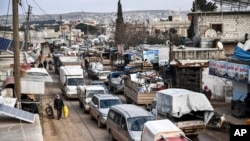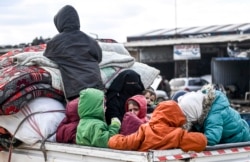U.N. agencies report around three million civilians are trapped in Idlib, unable to escape to other countries because borders with Syria have been closed. As a consequence, they say most of the displaced are moving into increasingly crowded areas toward the border between Idlib and Turkey.
Spokesman for the Office for the Coordination of Humanitarian Affairs Jens Laerke says about one-third or 330,000 of the displaced have fled to nearby areas in northern Aleppo, which also are under fire.
"The frontlines and relentless violence continue to move closer to these areas, which are packed with displaced people, with bombardments increasingly affecting displacement sites and their vicinity. We call for an immediate cease-fire to prevent further suffering and what we fear may end in a bloodbath,” Laerke said.
As safe space in Idlib continues to shrink, Laerke said the newly displaced are finding it increasingly difficult to find shelter. This, he said, is forcing tens of thousands of people to live in the open or in just partially covered buildings.
"More than 280,000 are staying in camps, which are already stretched beyond capacity, or in makeshift camps where they set up individual tents but where there are no basic services such as latrines. In the freezing winter, many people have resorted to burning their spare clothes, pieces of furniture or other materials that let out toxic fumes,” Laerke said.
Aid agencies report seven children, including a seven-month-old baby, have frozen to death in the sub-zero temperatures.
The United Nations says it plans to scale up humanitarian operations in northwest Syria to provide emergency aid for 1.1 million people over the next six months. For that, it says it will need $500 million.





